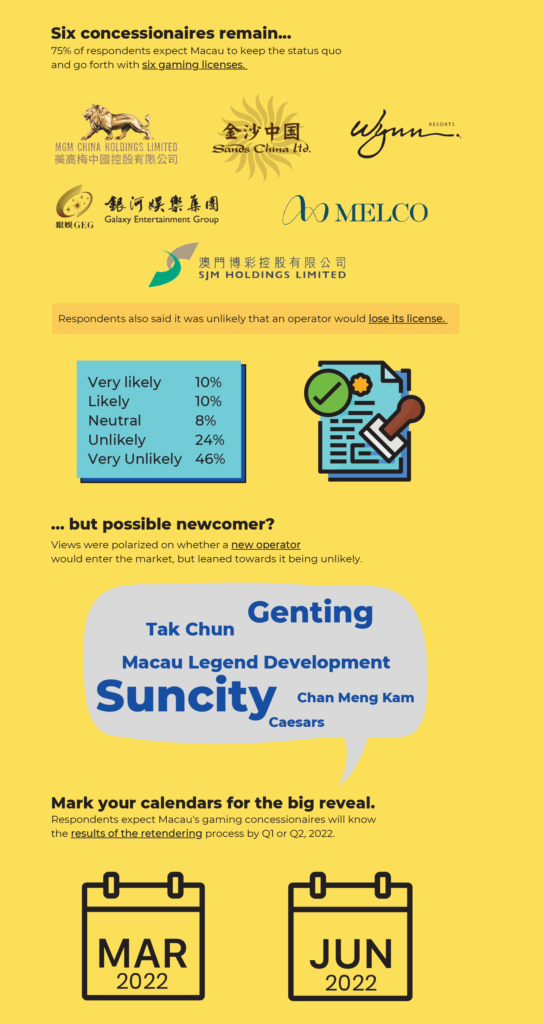Amendments to Macau’s draft gaming law suggest that the government is planning to do away with the current sub-concession system, but doesn’t clarify just how many licenses will be up for tender.
When the gaming concession system was first introduced to open up Macau’s gaming industry, only three licenses were on offer. That morphed into six, allowing for the entrance of Melco Resorts & Entertainment, Sands China and MGM China.
With the government now putting emphasis on a suitable and sustainable size for the industry, there has been considerable discussion over how the retendering process may shake out.

In our survey, we asked respondents how many concessionaires they expect to see in Macau and how likely it is that a new entrant will come into the market, or that one of the existing six will lose their license to operate.
All but 15 of the 56 respondents said they don’t believe there will be any change in the number of licenses. A few outliers said they only see scope for three, mirroring the original intentions for the market.
“I think six will be the upper limit,” Ben Lee, managing partner of IGamiX Management & Consulting said in a recent interview on the topic. “There may actually be fewer than this as far as Beijing is concerned, as they still don’t understand how three became six.”
A handful of respondents to the survey said they expect another license to be added. There has been pressure in the past to open the market further to local operators, who were not able to compete with the financial muscle and expertise of the U.S. bidders in the first round of tendering.
While six appears to be the magic number, the picture became blurred when we asked whether a current operator will lose a license, or whether there will be a new entrant. The answers suggest that there is more divergence of opinion.
In the survey choices, respondents were given the choice of very likely, very unlikely, neutral, likely and very likely.
Very likely meant there was a 90 percent chance or higher, with likely being between 70 percent and 89 percent. Very unlikely was 10 percent or lower, unlikely was between 11 percent and 30 percent.
The majority skewed towards there being little change in the status quo.
When asked how likely it is that one operator loses a license, 46.5 percent of respondents said it was highly unlikely, while a further 24.1 percent feel that it’s unlikely.
On the negative side, 10.3 percent of respondents said it was highly likely that one of the current six would be out, while 10.3 percent also said it was likely. On this question 8.6 percent were neutral.
Among respondents, 8.6 percent thought it very likely that a new entrant will come in with 17.2 percent seeing it as a likely scenario. Again, the majority of respondents skewed towards the likelihood that the status quo will be maintained, with 34.4 percent seeing a new entrant as highly unlikely and 18.9 percent saying it is unlikely.
Lee suggests that if one or more of the current licensees lose out in this round, we could see a wave of mergers and acquisitions in the industry in Macau.
In terms of a likely new entrant, the most often cited names were Suncity Holdings and the Genting Group. Suncity is linked to Macau’s largest junket operator, although in recent years the group has pushed to diversify and is now developing and operating its own integrated resorts.
Genting is one of the world’s largest operators, but failed to gain a license when the market was originally opened up and has since said it would still be interested in entering the market should a possibility open up.
Its Genting Hong Kong unit has been quietly building a new hotel in Macau, although it was forced to sell off a 50 percent stake in the project in November last year to keep its cash-strapped cruise business afloat.




























